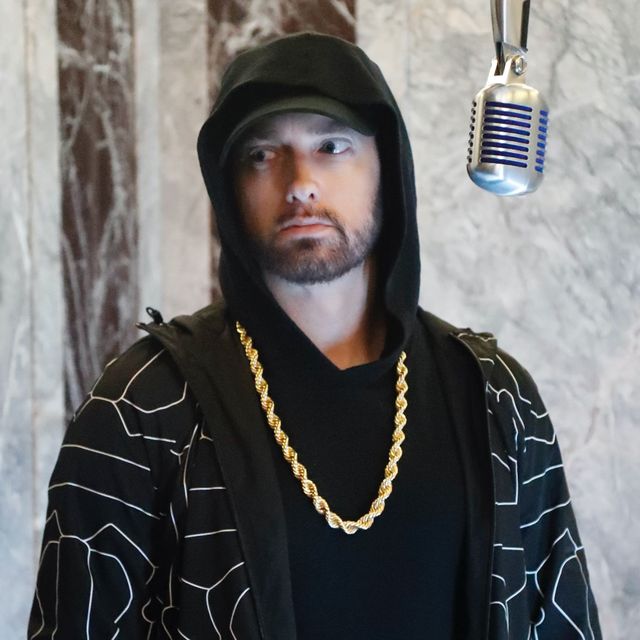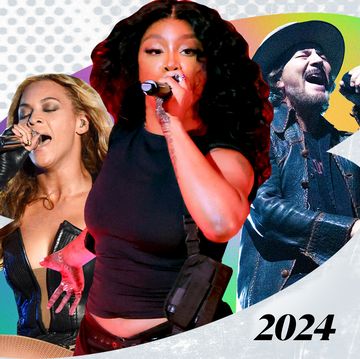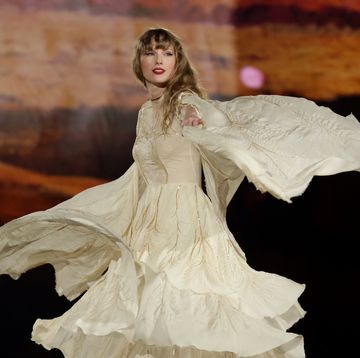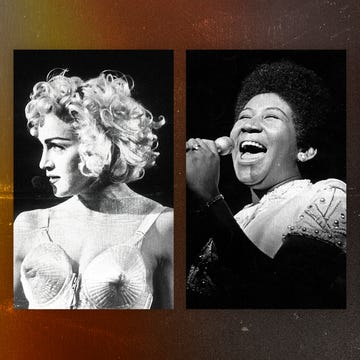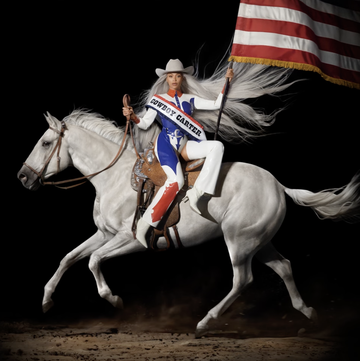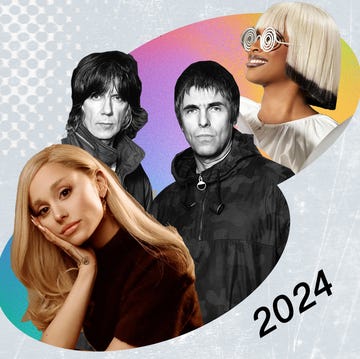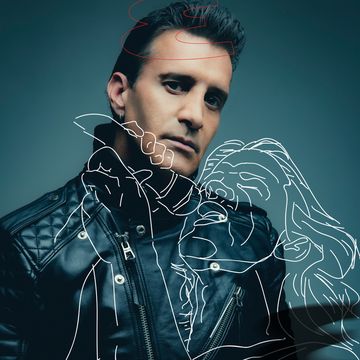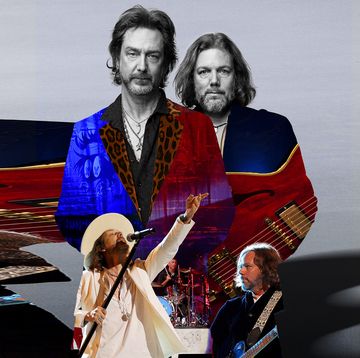Before we get to Eminem's surprise new album, Music to Be Murdered By—on which he compares himself to the the suicide bomber who killed 22 people at an Ariana Grande concert in 2017—it's important to discuss the artist within the context of his greater career.
In the early 2000s, when Eminem was reaching the peak of his career with the Marshall Mathers LP, he was the most controversial man in music. Lynne Cheney blamed him for Columbine. Other musicians protested his Grammys appearance. Canada almost didn't let him into their country to perform shows. Eminem rapped about horrible shit under the guise of free speech and artistic integrity. He inhabited characters and adopted personas that were violent and downright evil. Yet, critics praised him for his vivid storytelling, his bold blurring of the real world, humor, and fantasy. His flow—with it's dizzying internal rhymes and warp-speed poetic structure—was unlike anything else in music. Audiences adored him for pissing off the right people. As Rolling Stone wrote in its review of the Marshall Mathers LP, "He hits you with the lyrical complexity and detailed narratives of Biggie, the hilarious, is-he-kidding-or-not button-pushing of Howard Stern, the disaffected angry-white-boy-ness of Fight Club and the fearless, kill-me-if-you-can energy of Tupac."
That was two decades ago. That was a time when plastic, manufactured music was the dominate force in pop music. There was little honesty to be found in radio music—and Eminem brought a burst of something real in a safe time. In 2020, Eminem exists in a much different cultural landscape. The world is a lot less comfortable. The stakes are higher. Musicians—even the superstars like Jay-Z and Beyonce—have embraced their vulnerable side. Artists like the late Juice Wrld and Tyler the Creator stand out by being confessional. Over the last 20 years, as Eminem became one of the biggest pop stars in the world, his razor edge dulled dramatically. He still attempted to be that brash, problematic kid pissing off Christians and conservatives, but his approach had lost its effectiveness.
In 2016, Eminem's place in the zeitgeist became much more confusing in the age of Trump. Shortly before the 2016 presidential election, Eminem released a song called "Campaign Speech" on which he rapped:
Consider me a dangerous man / But you should be afraid of this dang candidate / You say Trump don't kiss ass like a puppet? / 'Cause he runs his campaign with his own cash for the funding? / And that's what you wanted? / A fuckin' loose cannon who's blunt with his hand on the button / Who doesn't have to answer to no one? / Great idea!
What's funny is, here, Eminem could have been describing himself in the early 2000s. In 2016 we entered a baffling time where Eminem was ironically warning conservatives about the dangerous language of their presidential nominee. And for a time, it seemed like Eminem's place in the late 2000s could be the perfect antithesis to Trump. His unforgettable BET cypher a year later was a promising moment for him to be the one artist to be truly equipped to fight back against Trumpism. But it didn't work out that way. Eminem couldn't do anything more outrageous than Trump and his supporters. It didn't matter if Eminem said shit that made Secret Service visit his house, because our President was defending neo-Nazis. (What's interesting is, another early 2000s staple, South Park, has experienced a same problem in the Trump years.)
Eminem backed off. His next albums turned away from politics and became obsessed with his own place in hip-hop. Eminem was mad at critics—not the man piloting our country on a kamikaze run. There was nothing Eminem could do to reclaim that edge he once had. And what's worse, is that when Eminem tried to react to this culture shift, he spectacularly failed. His homophobic slur directed at Tyler the Creator was met with outrage. This wasn't an issue of Eminem being silenced by PC culture. It was that he didn't have an effective way of communicating, of being edgy, in a time where we've made a little bit of progress in our language and sensibilities. There's no room for the shock jock in 2020 when the world is just mean—being a provocateur is the new normal in everyday life.
At midnight, Eminem released a surprise album. Like his other recent albums, much of it is reactionary. It's not debatable that Eminem still has the greatest flow of all time. But he's still struggling with figuring out what he stands for entering a new decade. What does Eminem have to say?
On the new album, there are moments of Eminem showing actual empathy, and that he is paying attention to what's going on outside of his own ego. On the track "Darkness," he raps from the perspective of Stephen Paddock, the man who killed 58 people and wounded 413 by opening fire at a music festival in Las Vegas. It's a difficult song to listen to, but the accompanying music video advocates for stricter gun control, with text at the end that reads: “When will this end? When enough people care. Register to vote at vote.gov. Make your voice heard and help change gun laws in America.”
People will certainly be angry that he rapped from the perspective of a domestic terrorist, that he reenacted one of the many acts of gun violence in America. But in this situation, at least he has a purpose—to highlight the horrors of our country's obsession with guns. It's a rare moment of clarity for Eminem.
Elsewhere on the album he doesn't show as much heart. This is where we get to his Ariana Grande lyrics: On "Unaccommodating," Eminem is essentially rapping about how he refuses to dilute himself for critics—that he's not going to change no matter how much he pisses people off. This line from his first verse pretty much shows the thesis of the song: "Please dawg, I need y'all to keep talking shit 'cause I feed off of it / I am the complete opposite of these retards who spit these weak bars, I'ma leave carnage."
Then later comes the line that everyone is mad about this morning:
But I'm contemplating yelling "Bombs away" on the game / Like I'm outside of an Ariana Grande concert waiting
Add to that the chorus:
Here comes Saddam Hussein, Ayatollah Khomeini / Where's Osama been? I been laden lately / Look at how I'm behaving me, they want me gone away / They wanna JonBenet me (Fuck you), I'm unaccommodating
The language of this song, and the intention, is the polar opposite of "Darkness." There, he evoked violence and disturbing imagery to highlight the horrors of gun violence. Here, on "Unaccommodating," he's using a terrorist attack (and the names of terrorists) to brag about how edgy he is. One could read this song as Eminem advocating for free speech, which is fine—but is it effective? Is it necessary? His tactics on this song reek of desperation, like the Eminem who can't get any attention in Trump's America. And what's weird is that Eminem's flippant reference to the Manchester bombing doesn't make sense considering he helped raise $2 million for the victims. If anything, it's more proof that he's saying it just to piss people off.
To be a provocateur in 2020 isn't to say something more offensive than everyone else. It's to say something bold with intention, in a unique way. There's no room for simply pissing people off just to be a troll—Trump and his legions of idiot supporters do that every day. And the contrast between "Darkness" and "Unaccommodating" highlight the struggle of modern day Eminem, where his purpose and place in this world is confounding.
